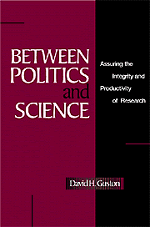Book contents
- Frontmatter
- Contents
- Tables and Figures
- Abbreviations
- Preface
- Introduction: Making Space for Science Policy
- Chapter 1 Science Policy: Structure and Boundaries
- Chapter 2 Understanding the Social Contract for Science
- Chapter 3 Challenges to the Social Contract for Science
- Chapter 4 Assuring the Integrity of Research
- Chapter 5 Assuring the Productivity of Research
- Chapter 6 Between Politics and Science
- Notes
- References
- Index
Chapter 3 - Challenges to the Social Contract for Science
Published online by Cambridge University Press: 14 October 2009
- Frontmatter
- Contents
- Tables and Figures
- Abbreviations
- Preface
- Introduction: Making Space for Science Policy
- Chapter 1 Science Policy: Structure and Boundaries
- Chapter 2 Understanding the Social Contract for Science
- Chapter 3 Challenges to the Social Contract for Science
- Chapter 4 Assuring the Integrity of Research
- Chapter 5 Assuring the Productivity of Research
- Chapter 6 Between Politics and Science
- Notes
- References
- Index
Summary
Despite much debate, and much apprehension and cries of alarm from the scientific community, it appears to me that the basis [sic] outlines of the ‘social contract’ between science and government proposed in Bush's famous report to President Roosevelt, Science the Endless Frontier, have remained more or less intact, and are still broadly accepted by public and politicians. Reality has changed much less than rhetoric. True, there has been some intrusion of government into the management of the extramural scientific enterprise, but after many threatening draft regulations and bursts of threatening rhetoric in the Congress, the end result has not been much real change, certainly not as great as the alarmists feared.
– Harvey Brooks (in Brooks and Schmitt 1985: 17)Introduction
In Chapter 2, I located the social contract for science in the broad consensus among Vannevar Bush, his political allies, and his political opponents that although funding science was a public responsibility, maintaining the integrity and the productivity of the enterprise was to be left to the scientists alone. Contrary to the epigraph from physicist and science policy scholar Harvey Brooks, the outline of the social contract for science was not limited to Bush's report. Neither were all the major tenets of Science: The Endless Frontier part of that outline. But the social contract for science can serve, as Brooks suggests, as the basis for assessing change in the relationship between the political and scientific communities over time.
- Type
- Chapter
- Information
- Between Politics and ScienceAssuring the Integrity and Productivity of Reseach, pp. 64 - 85Publisher: Cambridge University PressPrint publication year: 2000
- 1
- Cited by

